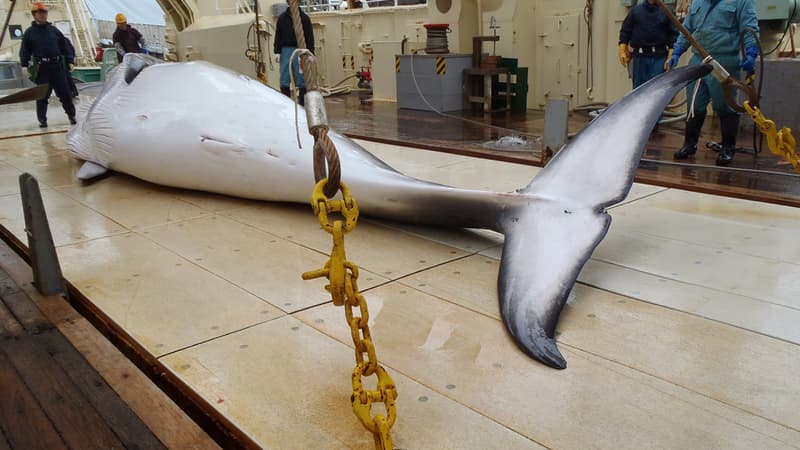The company wants to revive the consumption of whales in Japan. Kyodo Senpaku has just launched its third automated whale meat outlet in the city of Yokohama, after launching two in Tokyo. Behind the glass, cetaceans are prepared in all forms: steak, sashimi, or even bacon, CNN reports. A way to maximize the clientele while the company intends to invest and multiply distributors. Objective: 100 points of sale in the country in five years.
Supermarkets “harassed by anti-hunting groups”
It was wearing a whale-shaped hat that Hideki Tokoro, the company’s president, inaugurated the new group of three machines, located in a trendy shopping district where fashion boutiques rub shoulders with artisan bakeries. For him, these machines are an alternative to stores that are increasingly giving up the sale of packaged cetaceans.
“There are a lot of big supermarkets that are afraid of being harassed by anti-whaling groups, so they don’t use whale. So there are a lot of people who want to eat whale but can’t,” said the businessman.
The rations sold, which come from whales hunted exclusively in Japanese waters according to the company, cost between 1,000 and 3,000 yen, or between €7 and €21.
Decline in demand since the 1960s
In Japan, the government presents whale meat as an integral part of the country’s food culture, according to CNN. However, consumption is in free fall: after peaking at 233,000 tons sold per year in the early 1960s, it fell to just 1,000 tons in 2021.
In comparison, in the same year, 2.6 million tons of chicken and 1.27 million tons of beef were consumed in the country.
“Most Japanese have never eaten it. So how can we talk about a national culture if no one really participates in it?” said Katrin Matthes, head of Japanese policy at the international organization Whale and Dolphin Conservation (WDC). ), for charitable purposes.
The main cause of this change of use is the high price of whale meat compared to other traditional meats. The development of anti-hunting activism may also have played a role. The last major opinion poll dating from 2012 and commissioned by an anti-whaling association showed that around 27% of Japanese people were in favor of whaling, compared to 18% against it. The majority, more than 55% of those surveyed, said they were indifferent to this practice.
For the defenders of the consumption of whales, this type of meat contains more protein than other meats and has a lower carbon footprint.
Commercial whaling was banned in 1986 by the International Whaling Commission, an organization that aims to protect cetaceans and of which Japan is a member. The country had then officially prohibited this type of hunting but maintained operations “for scientific purposes”, a way of circumventing the decision. In 2019, Japan finally withdrew from the commission and allowed commercial whaling again.
Source: BFM TV


